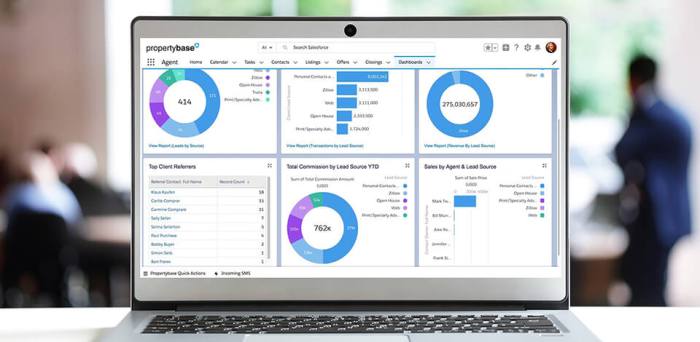Real estate sales software is revolutionizing the industry, transforming how agents manage leads, track properties, and ultimately, close deals. This technology offers a powerful suite of tools designed to boost efficiency and productivity, allowing real estate professionals to focus on building relationships and providing exceptional client service. From streamlined communication features to sophisticated market analysis capabilities, these platforms are reshaping the landscape of real estate transactions.
The benefits extend beyond individual agents, impacting entire brokerage firms. Centralized data management improves collaboration and reduces administrative overhead, while advanced analytics provide valuable insights into market trends and sales performance. This allows for data-driven decision-making, leading to more strategic business development and enhanced profitability.

Source: remarso.com
The real estate industry is dynamic and competitive. To thrive, agents and brokers need efficient tools to manage leads, track properties, and streamline the sales process. This is where real estate sales software comes in. This comprehensive guide explores the features, benefits, and considerations when choosing the right software for your needs. We’ll cover everything from CRM functionalities to marketing automation and market analysis tools, helping you navigate the landscape and select the perfect solution to boost your sales and productivity.
Understanding Real Estate Sales Software: Key Features and Benefits
Real estate sales software encompasses a range of tools designed to improve efficiency and productivity throughout the real estate sales cycle. These systems offer a centralized platform to manage various aspects of the business, from initial lead generation to closing the deal and beyond. The core features generally include:
1. Customer Relationship Management (CRM)
The Heart of the System
A robust CRM is the cornerstone of any effective real estate sales software. It allows you to:
- Manage Leads and Contacts: Organize and track potential buyers and sellers, including contact information, communication history, and property preferences.
- Track Interactions: Log calls, emails, and meetings, providing a complete history of your interactions with each client.
- Automate Follow-ups: Schedule automated email and SMS campaigns to nurture leads and stay in touch with clients.
- Segment Your Audience: Group contacts based on various criteria (e.g., property type, price range, location) for targeted marketing.
- Analyze Performance: Track key metrics like conversion rates and lead sources to optimize your sales strategies.
2. Property Management Tools
Streamlining Listings and Showings
Efficient property management is crucial. Effective software will:
- Centralized Property Database: Maintain a detailed database of all listed properties, including photos, descriptions, and relevant documents.
- Listing Management: Easily create and update property listings across multiple platforms (MLS, Zillow, Realtor.com, etc.).
- Showing Scheduling: Simplify scheduling property showings and manage agent availability.
- Document Management: Store and access all relevant documents (contracts, disclosures, etc.) securely in one place.
3. Transaction Management
Ensuring Smooth Closings
Streamlining the transaction process is essential for minimizing errors and delays:
- Contract Management: Create, manage, and track real estate contracts electronically.
- e-Signature Capabilities: Enable secure electronic signatures for faster contract processing.
- Compliance Tracking: Ensure compliance with all relevant regulations and disclosure requirements.
- Commission Tracking: Monitor and manage commission payments efficiently.
4. Marketing and Communication Tools
Reaching More Clients
Effective marketing is key to generating leads. Look for software that integrates:
- Email Marketing: Create and send targeted email campaigns to nurture leads and promote properties.
- Social Media Integration: Share property listings and other marketing materials on social media platforms.
- Website Integration: Integrate your software with your real estate website for seamless lead capture.
- SMS Marketing: Use text messaging to communicate with clients quickly and efficiently.
5. Reporting and Analytics

Source: fixthephoto.com
Data-Driven Decision Making
Data-driven insights are crucial for improving performance. The best software will provide:
- Customizable Reports: Generate reports on key performance indicators (KPIs) such as lead conversion rates, sales volume, and marketing ROI.
- Real-time Dashboards: Monitor key metrics in real-time to track progress and identify areas for improvement.
- Data Export Capabilities: Export data to other applications for further analysis.
Choosing the Right Real Estate Sales Software: Key Considerations
Selecting the right software depends on your specific needs and budget. Consider these factors:

Source: daebuild.com
- Your Budget: Software options range from affordable solutions for individual agents to enterprise-level systems for large brokerages.
- Your Team Size: Choose software that can scale to accommodate your current and future needs.
- Your Tech Skills: Opt for user-friendly software that is easy to learn and use.
- Integration Capabilities: Ensure the software integrates with other tools you use, such as your website, email marketing platform, and accounting software.
- Customer Support: Choose a provider that offers excellent customer support and training.
- Security and Compliance: Prioritize software that meets industry security and compliance standards.
Popular Real Estate Sales Software Options
The market offers a variety of real estate sales software solutions. Some popular choices include (Note: This is not an exhaustive list, and the best choice depends on your specific needs):
- Real Estate CRM Software Examples (Examples only, research current offerings): [Insert examples of popular CRM software here, with brief descriptions. Avoid endorsing specific brands.]
- Property Management Software Examples (Examples only, research current offerings): [Insert examples of popular property management software here, with brief descriptions. Avoid endorsing specific brands.]
- Transaction Management Software Examples (Examples only, research current offerings): [Insert examples of popular transaction management software here, with brief descriptions. Avoid endorsing specific brands.]
Frequently Asked Questions (FAQs): Real Estate Sales Software
Here are some frequently asked questions about real estate sales software:
- Q: How much does real estate sales software cost? A: Pricing varies greatly depending on the features, functionality, and vendor. Expect to find options ranging from free (with limited features) to several hundred dollars per month for more comprehensive solutions.
- Q: Is real estate sales software difficult to use? A: Most modern software is designed to be user-friendly. However, the learning curve may vary depending on your technical skills and the complexity of the software.
- Q: Can I integrate my existing tools with real estate sales software? A: Many software solutions offer integration capabilities with other tools you may already be using. Check the software’s specifications to ensure compatibility.
- Q: What are the benefits of using real estate sales software? A: The benefits include increased efficiency, improved lead management, better communication with clients, streamlined transactions, and data-driven decision-making.
- Q: Is my data secure with real estate sales software? A: Reputable providers prioritize data security and compliance with industry standards. Look for software with robust security features and a strong track record.
Conclusion
Investing in the right real estate sales software can significantly improve your productivity, efficiency, and overall success. By carefully considering your needs and researching available options, you can find a solution that empowers you to manage your business effectively and achieve your sales goals. Remember to prioritize user-friendliness, integration capabilities, and robust security features when making your decision.
References
[Insert links to reputable sources such as industry publications, software review sites, etc. Examples: NAR, Inman, various software review sites.]
Call to Action
Ready to boost your real estate sales? Start exploring real estate sales software options today and discover how the right technology can transform your business!
In conclusion, the adoption of real estate sales software represents a significant advancement for the industry. By leveraging technology to improve efficiency, enhance communication, and provide valuable data-driven insights, real estate professionals can achieve greater success in today’s competitive market. The future of real estate sales is undoubtedly intertwined with the continued development and integration of these powerful tools.
User Queries
What types of features are commonly found in real estate sales software?
Common features include CRM (Customer Relationship Management) tools, lead management systems, property listing management, marketing automation, transaction management, and reporting/analytics dashboards.
How much does real estate sales software typically cost?
Pricing varies widely depending on the features, scalability, and vendor. Expect monthly subscription fees ranging from basic plans for individual agents to enterprise-level solutions for large brokerages.
Is real estate sales software difficult to learn and use?
Most software providers offer training and support to help users get started. While the initial learning curve may exist, many platforms are designed with user-friendliness in mind, making them relatively intuitive to navigate.
Can real estate sales software integrate with other tools I already use?
Many platforms offer integrations with other commonly used business applications, such as email marketing services, calendar apps, and document management systems. Check with individual vendors to confirm specific integrations.
